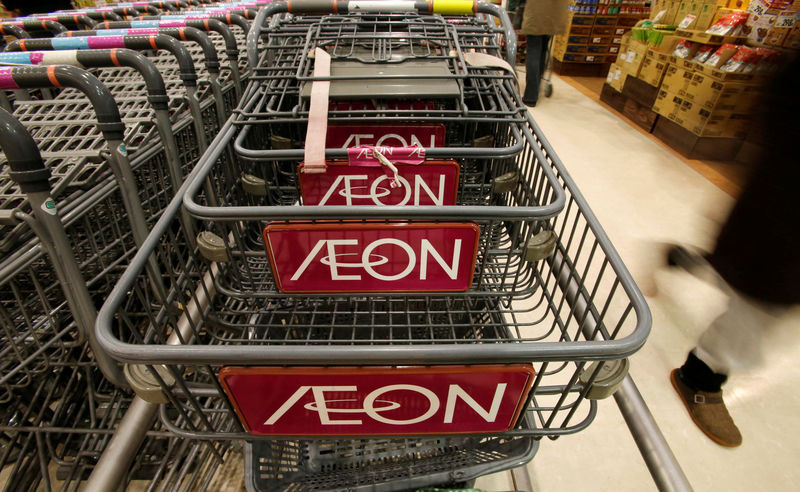By Leika Kihara and Kaori Kaneko
TOKYO (Reuters) - Naruhito Nogami, a 37-year-old systems engineer in Tokyo, drives to discount stores on weekends to bulk buy cheap groceries, even though he earns enough to make ends meet and the prospects for Japan's economic recovery are brighter.
"I do have money, but I'm frugal anyway. Everyone is like that. That's just the way it is," he says.
Kazuko Sato, a 50-year-old animation artist, also frequents discount chain Daiso, where most items ranging from groceries and bath towels to kitchenware sell for just 100 yen ($0.91).
"I look for things here first, and if they aren't here then I go to the supermarket," she says, cradling a basket in the stationery aisle. "My job and salary are unstable so I need to be careful about my spending."
People like them have prompted some companies to embark on sweeping price cuts, showing how tough it will be to eradicate Japan's deflationary malaise despite the improving economy.
It also highlights a new paradox facing the Bank of Japan: a disparity between solid growth and stubbornly weak inflation.
Top retailer Aeon Co (T:8267) is cutting prices for over 250 grocery items this month to lure cost-savvy shoppers, and Seiyu, operated by Wal-Mart Stores (N:WMT), cut prices on more than 200 products from February.
"It's unthinkable for us to raise prices at this stage," Fast Retailing Co (T:9983) CEO Tadashi Yanai said after the owner of clothing brand Uniqlo reported flat revenue on Thursday.
To be sure, many retailers say they are protecting their bottom line by offering not just discounts but high-end products.
"It's not just prices consumers are looking at. They are just being selective," said Takaharu Iwasaki, president of supermarket chain operator Life Corp (T:8194).
But central bank policymakers are struggling to explain why inflation and wages remain so low even as Japan's economy enjoys its third-longest recovery since World War Two.
"It's a new conundrum for us," one official said. "It just shows how sticky Japan's deflationary mindset is."
DEMOGRAPHICS DRAG
Japan's economy has sustained a modest recovery cycle that kicked off when Prime Minister Shinzo Abe took power in late 2012 and launched his "Abenomics" package of aggressive monetary, fiscal stimulus measures and structural reforms.
A recent rebound in overseas demand has helped boost exports and output, pushing up business confidence to its highest in a year and a half, with companies upbeat on their spending plans.
Encouraged by recent positive data, the BOJ is expected to offer a more upbeat view of the economy at this month's rate review than it did last month, people familiar with the matter said.
The benefits of the recovery have yet to reach households, though, despite four years of heavy money printing by the central bank and fiscal spending packages.
Real wages have been largely flat despite job losses hitting a 22-year low, as firms remain wary of raising wages.
Core consumer inflation remained stuck at 0.2 percent in February, well below the BOJ's ambitious 2 percent target, as companies hold back on price rises for fear of scaring away cost-sensitive households.
Japan's demographics are a key factor working against consumption. Nearly 30 percent of the population will be aged 65 or above in 2020, according to a government estimate. Living off pensions, elderly households are unaffected by any wage hikes and tend to withhold spending, analysts say.
Miyako Minamizawa, a 65-year-old pensioner in Tokyo, says the recovery hasn't changed her life. "I don't feel like the economy is doing well," she said, adding she is dipping into her savings because her pension isn't enough to get by on.
In the capital's upmarket Ginza shopping district, 72-year-old Shimako Naito said: "I used to often impulse buy, on quite expensive clothes and jewellery, but now I take my time and try and buy when things are cheaper."
Inefficiencies in Japan's highly-protected farm sector have kept fresh food prices high and volatile. A weak-yen trend also hurt households by pushing up the price of imported goods.
Food prices rose 1.7 percent in 2016 from a year earlier, even though overall consumer prices fell 0.1 percent.
Households used 26 percent of their income to buy food last year, the highest level in almost three decades, leaving them with little left to spend on non-necessities.
Food products topped the list of items that households spent more on, a quarterly BOJ survey showed this month, while households cut spending most on eating out, clothing and travel.
Roughly 80 percent of households who replied to the BOJ's survey said they feel price rises are a bad thing, a sign the central bank has failed to convince the public of the benefits of putting a sustained end to growth-sapping deflation.
Masayuki Yamamuro, 51, who works at a real estate firm, says he eats out less and is cutting down on spending because grocery shopping is becoming more expensive.
"My salary hasn't risen. I want to buy a car, own a house or go travelling. But I'm not able to do that."
($1 = 109.1600 yen)
